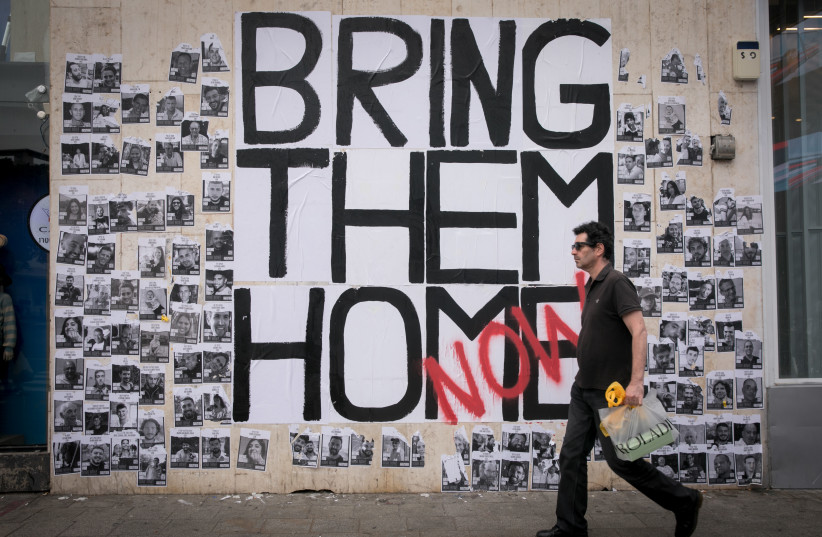Israel has just experienced 100 days unlike any other in its history. That’s not to say it’s been the worst 100 days – there’s lots of competition for that, from the 1948 War of Independence to the 1973 Yom Kippur War, to the Second Intifada.
But as far as the character of the ongoing tragedy and its effect on the country, there’s a stark quality about the first post-October 7th 100 days that the country has never seen in such overwhelming abundance and focus – a maddening combination of determination, shock, grief, anger, and resilience that has left all of us exhausted.
Israelis have come together in unprecedented ways – on the battlefield, and as volunteers for the thousands whose lives have been impacted by the war, providing emotional, physical, and monetary aid to fill the gaping hole that the government hasn’t been able, or willing, to cope with.
The events over the last two days – from the vigil held at Hostages Square in Tel Aviv to marches and bike rides throughout the country – point to how encompassing the aftermath of October 7 has been and how the issue of the 136 hostages being held by Hamas is at the forefront of everyone’s minds.
What's next?
The question now is: What will characterize the next 100 days?

From all assessments, the war in Gaza will not have ended, and the return of the hostages is not a sure thing at all. How will the mood of the country change, as the hostages continue to languish in captivity and as the death toll of soldiers trying to find them and root out Hamas will inevitably continue to rise?
Will the sense of unity and purpose that characterized the first 100 days give way to blame, dissension, and politics?
That trend has already reared its ugly head at the top of the chain, most recently at Saturday night’s cabinet meeting when Defense Minister Yoav Gallant stormed out after a perceived slight from his rival, Prime Minister Benjamin Netanyahu, over Gallant’s aides being allowed into the room.
On the surface, Netanyahu allowed petty politics to interfere in the vital running of the war – and not for the first time. It’s unfathomable what the war effort would be like without responsible professionals like Gallant and Minister-without-portfolio Benny Gantz in place counteracting the damaging actions of other ministers such as National Security Minister Itamar Ben-Gvir and Finance Minister Bezalel Smotrich.
But it’s not just the government that is threatening to come apart at the seams. As the hostages remain imprisoned, and as the army gets more mired down in Gaza (whether in Phase 3 or any other phase of the war), the frustration among soldiers, the families of the hostages, and the country at large is going to grow.
The natural tendency is to throw blame, and the closest and easiest target is the government. The slogan “Bring Them Home Now!” implies that all Israel has to do is snap its fingers and decide that the hostages should be released, and that would happen.
The reality, as much as we citizens are privy to what’s going on behind the scenes, is that a scenario like this one will only take place if Israel stops its war on Hamas, withdraws all the IDF troops from Gaza, and releases oodles of Palestinian prisoners held in Israeli jails.
That would leave Hamas intact, to an extent, and enable the terrorist entity to resume its rule of Gaza and prepare for the next massacre. It would also mean that the deaths of the soldiers who have fallen since October 7 will have been in vain.
As we enter the next 100 days, maybe the “Bring Them Home Now!” slogan, which appears to be aimed at Netanyahu and his cronies, should be changed to “Let our People Go” – directed toward the only entity that can make that wish come to fruition: Hamas.
It’s timely, with the current weekly Torah portions concerning themselves with the Ten Plagues wrought on Egypt and Pharaoh, and it shifts the onus onto our enemy.
The primary challenge of the next 100 days is to remember who that enemy is. It’s not our government, and it’s not our army. Nor is it the people in Hostages Square who are demanding the release of the hostages, at all costs.
The enemy is Hamas, and they would like nothing more than for the internal struggles that gripped Israel before October 7 to reemerge as a dominant force, with blame replacing unity as the primary fuel running the country.
In the next 100 days, it’s incumbent on Israelis to remember: Hamas attacked on October 7 and murdered the largest number of Jews at one time since the Holocaust. They’re the ones who kidnapped and still hold captive 136 innocent people – children, women, and the elderly among them.
And Hamas, like Pharaoh, could spare their people unimaginable suffering by simply doing one thing: Let our people go.
